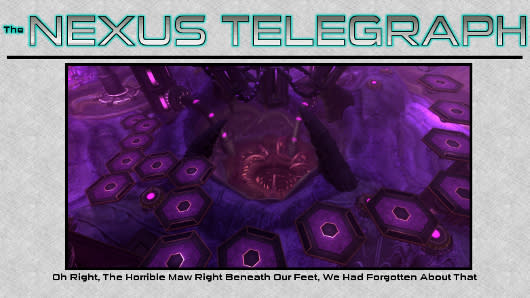The Nexus Telegraph: WildStar ain't doing so good
If you somehow missed it, last week the WildStar team announced that the game will be squishing into megaservers to help bolster populations. What the hell happened?
Contrary to what the developers would like you to believe, this is not good news. It's especially bad news if you're part of the roleplaying community, as you're about to get shoved into a server configuration that's almost specifically designed to prevent you from roleplaying outside of a handful of shared plots, but it's bad news for everyone. And it's bad news for the game when server merges are a reasonable reaction after less than three full months of operation.
We all know that the game launched to good reviews, and it's far too early to say, "Well, it failed." At the same time, this is not a sign of a robust and vibrant future. This is the first stage of an organized retreat, and it doesn't inspire confidence. So what, exactly, took place that brought the game from the high of its launch to server mergers today?

The short answer, of course, is a bunch of stuff. The game threw its lot in very heavily with the hardcore raiding crowd, presenting a steep and appreciable challenge for people looking to really go up against the hardest stuff imaginable. This formed a real brick wall for a lot of people who made it through the long and grinding attunement process in the first place, which in and of itself was a brick wall for a lot of people -- never mind that a lot of people were never going to be interested in raiding at all, much less the brutally old-school version that was put forth as the game's best-of-the-best endgame.
But that's not even close to the sole culprit. I might be happy for the way the game works its quests, but I can also see exactly why people would feel like the net result was 18 quests just for doing one thing. Combat requires an extraordinary amount of attention to be paid at all times, and while that's a good thing insofar as it keeps you focused, it also means that just logging in and doing things requires a lot more attention and skill than other games. Having an off night in WildStar will kick you down hard.
And that's not even touching on the fact that the attunement processes were just one of many, many grindy portions of the game. Reputations skew on the side of grinding that makes you feel as if you're not making much progress for each individual daily, or they require you to take part in events that you don't have much control over. You've got plenty of small-group content, but the medal system punishes anyone who's not in the top tier, rather than just rewarding good performance with, well, a smooth run.
None of this is visible on launch day, and boy, the game makes a great first impression. It's still a game I like a great deal. But it's also a game with problems that start coming into focus as you get up in levels. It even makes a mistake that Star Wars: The Old Republic made, insofar as every character you level up will be going through almost the exact same zones, with the only difference being the first two zones you choose between.
I found it oddly telling that at PAX Prime, the developers expressed some surprise at how many players focused on solo content, when the devs at PAX East earlier this year made open statements that it was a known fact that a lot of players just wouldn't group up. What happened between those two points?

I would speculate that it was a matter of making the same fundamental mistake you see in every single Batman story. Thug #50 has seen 49 of his buddies run up and try to punch Batman into submission, but despite that, he assumes that this time, the same plan that failed everyone else will work. That people would totally change their tune and everyone would want to be super hardcore.
Nope. So what comes now?
As damaging as the megaserver move is going to be for a lot of communities, it's probably the best choice for the game as a whole. What Carbine Studios needs to do now is start addressing the flaws that drove people away from the game in the first place, and promptly. Starting to work on a free-to-play transition now would be a smart idea as well, rather than waiting until the population dips any further.
But the key, I think, can be found in what happened with Warhammer Online. That game came out with marvelous reviews, and it's often what I like to point to as an example of how high-scoring reviews at launch do not lead to stellar performance in the long run. What really hurt the game, in large part, was the fact that its post-launch strategy remained fixed in stone even after it became clear that the game had issues. Rather than stepping back and realizing that the original plan was no longer viable, it more or less doubled down on what was already failing to keep players -- and by the time that it was accepted that this plan wouldn't work, it was too late to do much more than bail water.
This industry is based on momentum. Once you're at this point, your best bet is to fall back slightly, change gears, and re-evaluate how you manage your expectations, something that the aforementioned Star Wars: The Old Republic did quite well.
WildStar is not going to be the next World of Warcraft, and let's be honest: It was never going to be. The game inherited some good ideas from that game's original incarnation, but it's time to shed the stuff that World of Warcraft abandoned years ago for good reason -- it's time to refocus on the core customers the game actually has.
The approach for launch worked at getting a lot of good reviews, but now it's just leaving the game with an imminent server crush.
As always, feedback is welcome in the comments down below or via mail to eliot@massively.com. Next time around, I'm hoping to have some better news to discuss with you lovely folks, as I don't particularly like writing the more depressing sorts of columns in the first place.

Here's how it is: The world of Nexus can be a dangerous place for a tourist or a resident. If you're going to venture into WildStar, you want to be prepared. That's why Eliot Lefebvre brings you a shiny new installment of The Nexus Telegraph every other Monday, giving you a good idea of what to expect from both the people and the environment. Keep your eyes peeled, and we'll get you where you need to go.


